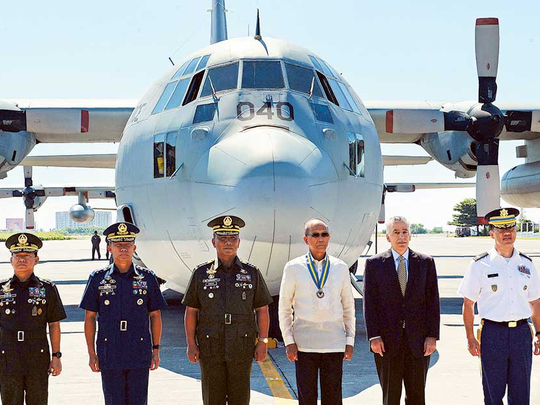
Manila: Philippine Foreign Affairs Secretary Perfecto Yasay and US diplomat Daniel Russel have said the Philippines and United States will remain close allies and the two countries are deeply interdependent on each other.
Speaking after a closed-door meeting with US Assistant Secretary of State for East Asian and Pacific Affairs Russel, Yasay assured Manila would continue to remain allies with the Washington.
“The meeting has nothing to do with breaking our relationship with the United States, or breaking diplomatic ties,” Yasay said on Monday.
“We continue to work towards strengthening our ties with the United States.”
The statement was an apparent clarification to that made by President Rodrigo Duterte last week, days ahead of meeting Chinese officials in Beijing.
At that time, the Philippine leader said the time had come for the country to separate from the US.
Duterte’s recent rhetoric have been awash with anti-American sentiments.
Aside from economic ties, Philippines and US security relations have been mainly governed by the 1951 Mutual Defence Treaty.
Yasay said Duterte’s words were was not particularly meant as a policy statement but on the other hand, was aimed at addressing Filipinos and calling on them to break away from the mindset of dependency on the US, and subservience to foreign interests.
The US and Philippines regard each other as significant security — as well as trading — partners.
During Duterte’s visit to Beijing, the two countries made a significant stride towards rapprochement.
Ties between Manila and its bigger northern neighbour have been strained over conflicting territorial claims over certain islands located in the South China Sea.
For his part, Russel said “improved relations between the Philippines and China should not come at the expense of the United States.”
Russel said ties between the US and the Philippines run deep and it would take more than a matter of semantics and fiery rhetoric to drive a wedge between the two countries.
“Now let me begin by saying, I love the Philippines. And a big part of the message that Sec conveyed and I conveyed is that there is a deep well spring of affection and deep well spring of respect between the United States and the Republic of the Philippines,” he said.
“My belief that those deep roots between the American and Filipino people will ensure stability in our relationship over the long term,” he said.
The Philippines is deeply dependent on the US, not just economically, but also militarily. Manila had been a beneficiary of America’s foreign military assistance under the Excess Defence Articles Act as well as Foreign Military Financing programme.
On Monday, US Ambassador Goldberg Philip Goldberg turned over a C-130 aircraft to the Philippines government.
The inclusion of the new heavy lift cargo aircraft will boost the capability of the Philippine Air Force in moving military as well as humanitarian loads to other parts of the country where such are needed.
The addition of the repurposed former airborne tanker of the US Air Force to the Philippine fleet will boost the country’s capability to move significant amount of loads specially during humanitarian missions.
“As a strong ally, we stand ready to honour our commitments. We stand by international law and we stand by the Philippines,” Russel said, adding that relations between the Philippines and the US have transcended the colonial norms of the past and are now standing as equals interdependent of each other.











